
20 Oct, 2016
SMEs, Africans big winners at World Tourism Conference 2016 in Penang
Penang, Malaysia — The travel & tourism industry broke new ground at the World Tourism Conference organised in the Malaysian coastal city of Penang between 17-18 October. Free registrations for all 733 delegates from 32 countries and powerful speakers who delivered practical, insightful, well-researched content combined to produce an event that more than lived up to the theme, “Delivering The Unexpected”. Hundreds of Malaysian delegates harvested a treasure trove of material to boost their doing-business skills. Turning out in strength, African delegates were most active, their thirst for insights into Asia’s tourism development experience, both pros and cons, more than satiated.
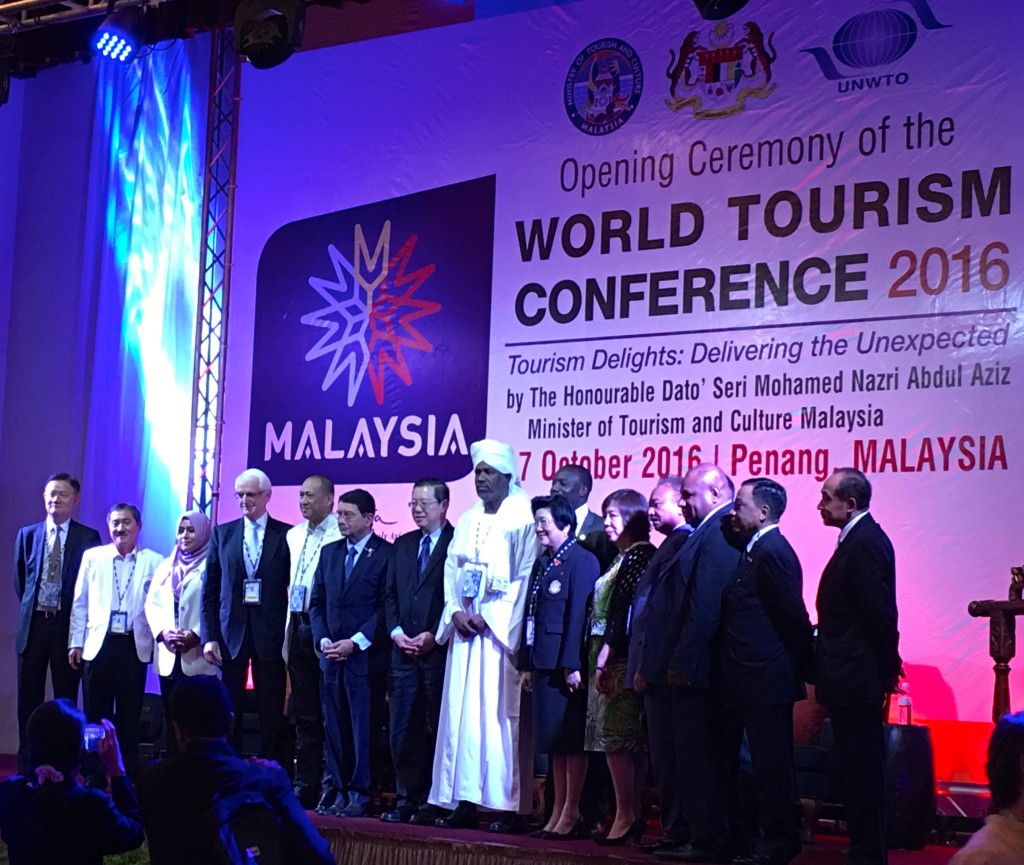
The line-up of ministers, senior dignitaries and executives at the opening session.
Organised by the Ministry of Tourism and Culture in collaboration with the UN World Tourism Organisation, the event, the fourth of its kind organised by MoTaC since 2007, won a huge compliment from UNWTO Secretary-General Dr Taleb Rifai. In his closing remarks after two days of authoritative presentations, he expressed surprise at seeing the hall still chock-full. “Usually, in our conferences, it’s full on the first day when all the senior people come. Then they go away. By the second day, it’s usually only half full. I am happy to see so many people still here.”
The reason for this was simple. The free registration allowed hundreds of small and medium sized enterprises and entrepreneurs to attend. These grassroots Malaysian taxpayers revelled in the opportunity to share experiences, air grievances, access insights and interact with each other and the speakers. The quality of their questions, in turn, upgraded the level of discussion. It was a huge point of differentiation from the sponsor-driven, CEO-dominated events which are the monotonously boring norm these days. Minister of Tourism and Culture Dato’ Seri Mohamed Nazri bin Abdul Aziz stayed through the entire event, attending the sessions when he was not tied down with the visiting ministers.
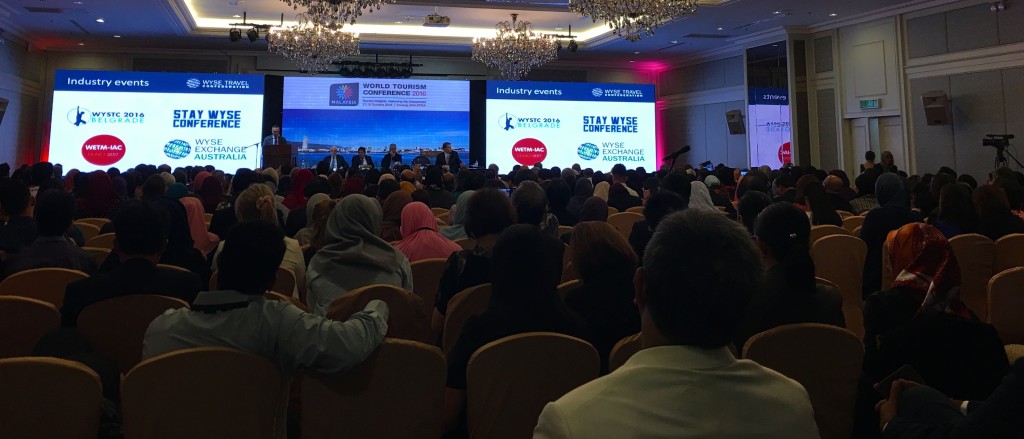
Packed house on the first day…
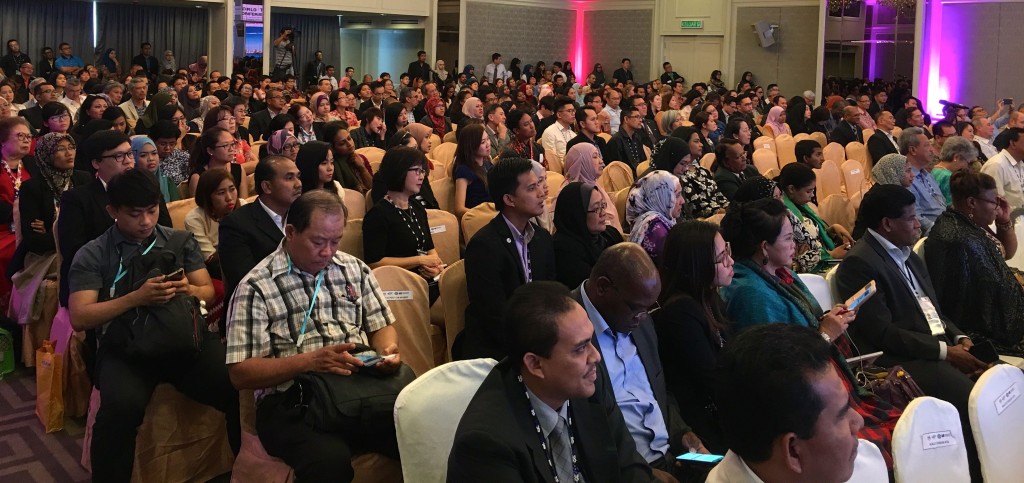
….and on the second day, too.
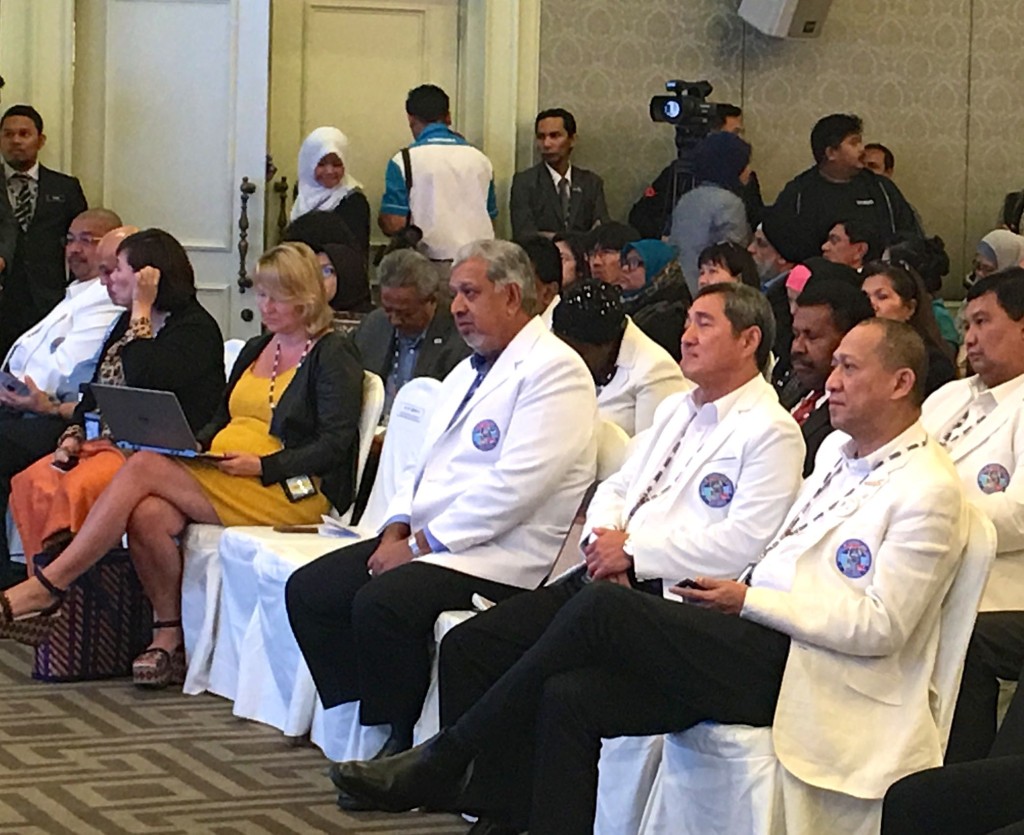
From right to left, Malaysian Tourism and Culture Minister Dato’ Seri Mohamed Nazri, Ministry Secretary General Tan Sri Ong Hong Peng and Tourism Malaysia Director Dato Seri Mirza Mohammad Taiyab.
On the surface, the WTC 2016 programme appeared to feature the usual gang of suspects set to pontificate on the usual roster of subjects. It turned out to be the opposite and delivered the unexpected. After the scene-setting big-picture context and back-thumping diplomatic niceties of the opening ceremony, the conference began with global trends and future scenarios from the UNWTO and WTTC. Tan Sri Dr. Ong Hong Peng, the MoTaC Secretary-General, gave the Malaysian perspective on how MoTaC sees the Future Trends Beyond 2030 and how it plans to target and match tourism demand. Two international organisations that provided their perspectives were the International Convention and Congress Association and the World Youth Student and Educational Travel Confederation.
Then came two back-to-back home-grown Malaysian success stories: AirAsia, launched with an investment of one Malaysian ringgit by entrepreneur Tony Fernandes and now one of the world’s best known low-cost airlines; and YTL Hotels, a luxury group started by entrepreneur Tan Sri Dr Francis Yeoh for those who want to spend their time “doing nothing”.
Delegates then heard Dato Seri Idris Jala, Chief Executive Officer of Performance Management and Delivery Unit (PEMANDU), give a commanding overview of how tourism is factored into Malaysia’s national development plans. Prof. Dr. Amran Hamzah, Professor of Universiti Teknologi Malaysia, demonstrated a case-study example of how to convert theory of sustainability into practise at the community level. Mr. Peter Semone, Chairman of the PATA Foundation, took participants on a photographic journey with a human face through the Mekong region and Timor Leste where he has done consultancy work for the UNWTO.
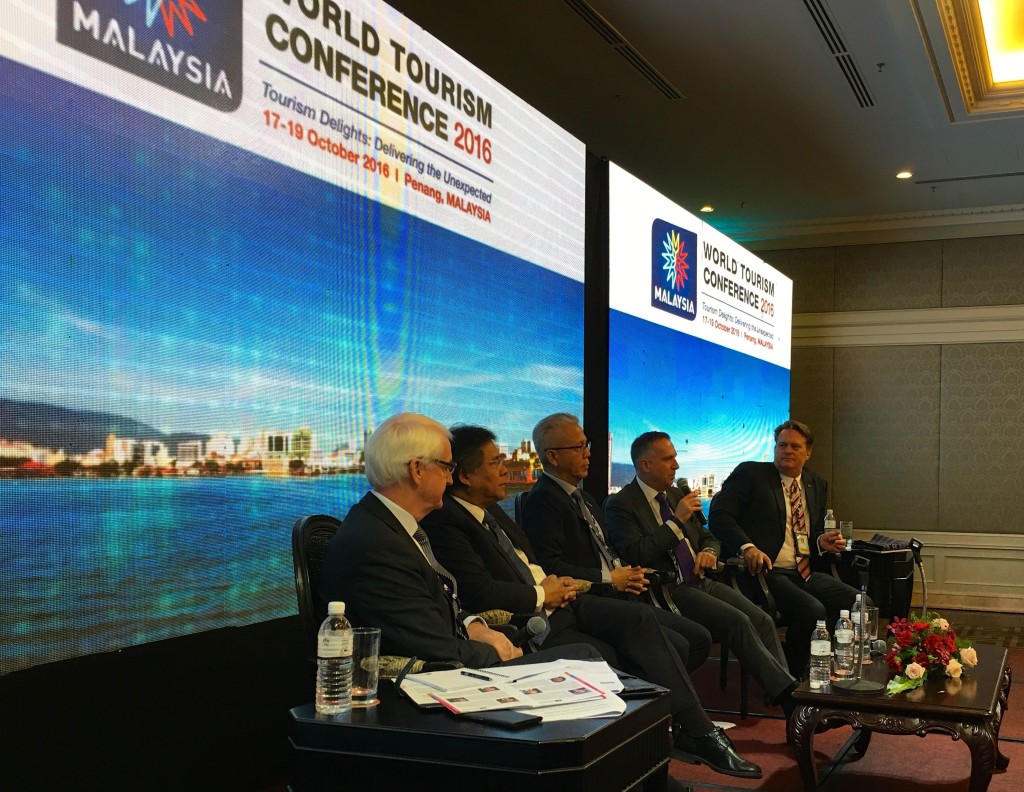
From left to right, Gerald Lawless, Idris Jala, Amran Hamzah, David Chapman and Peter Semone
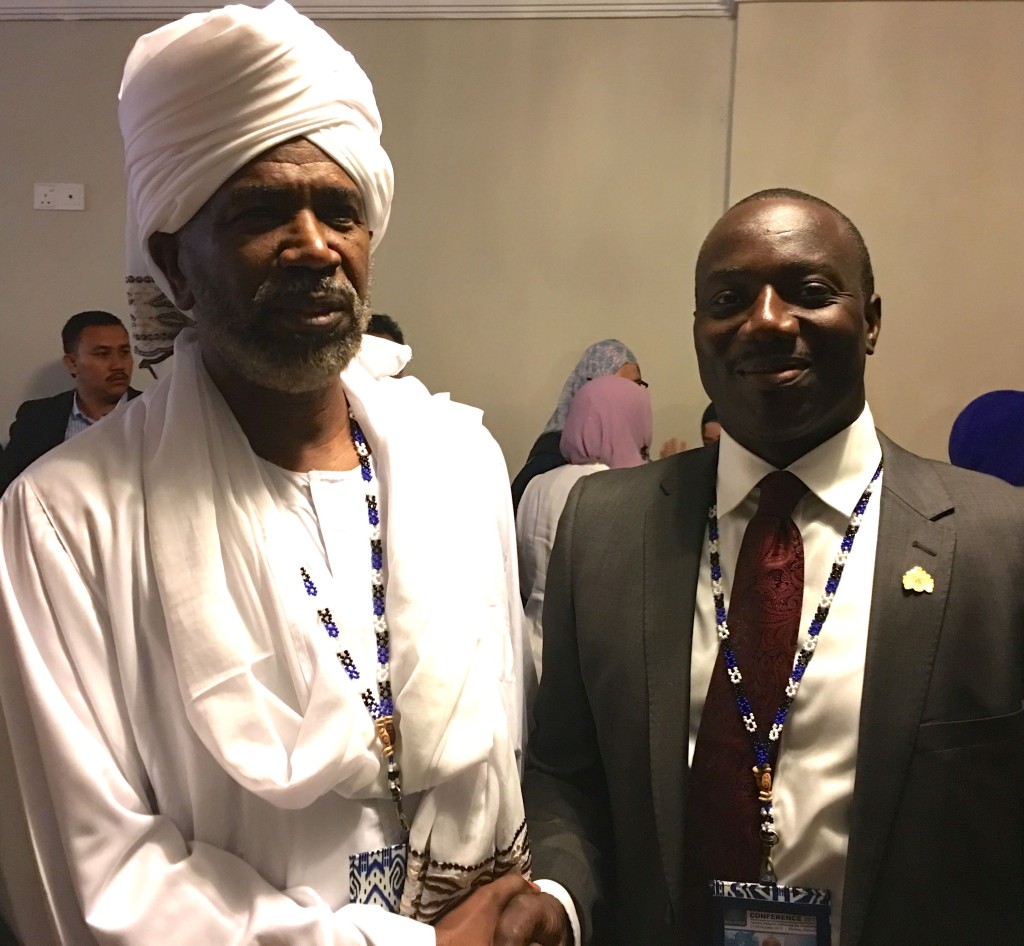 Tourism Ministers Mohamed Abuzaid Mustafa Mohamed of Sudan and Benjamin Roberts of Gambia. |
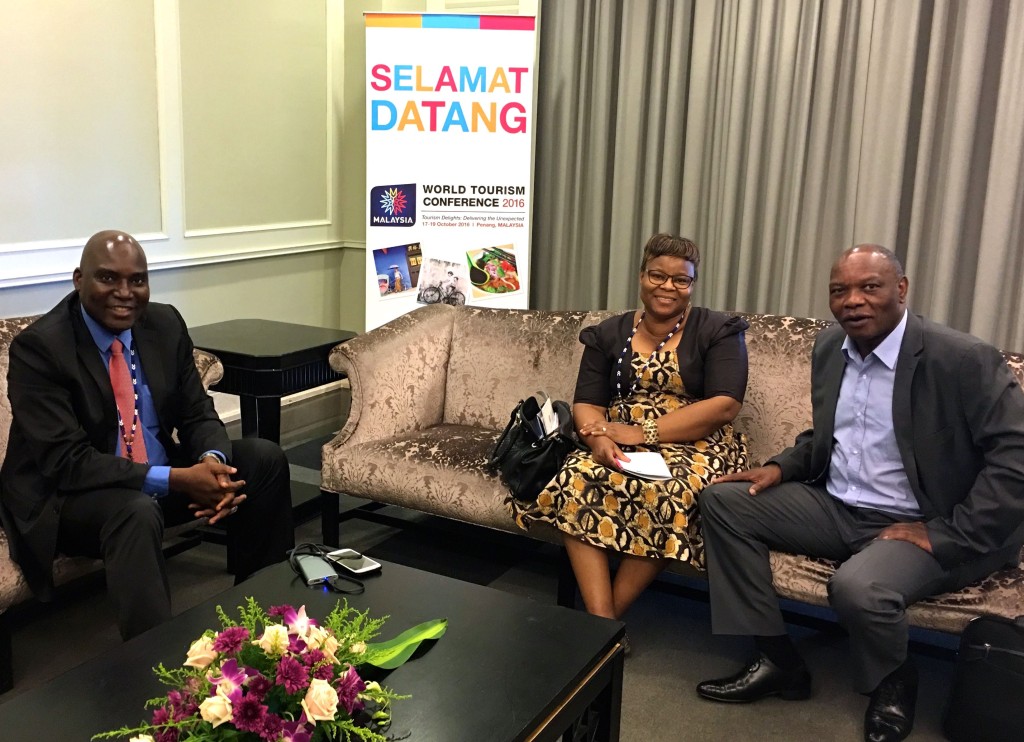 The Zimbabwe delegation |
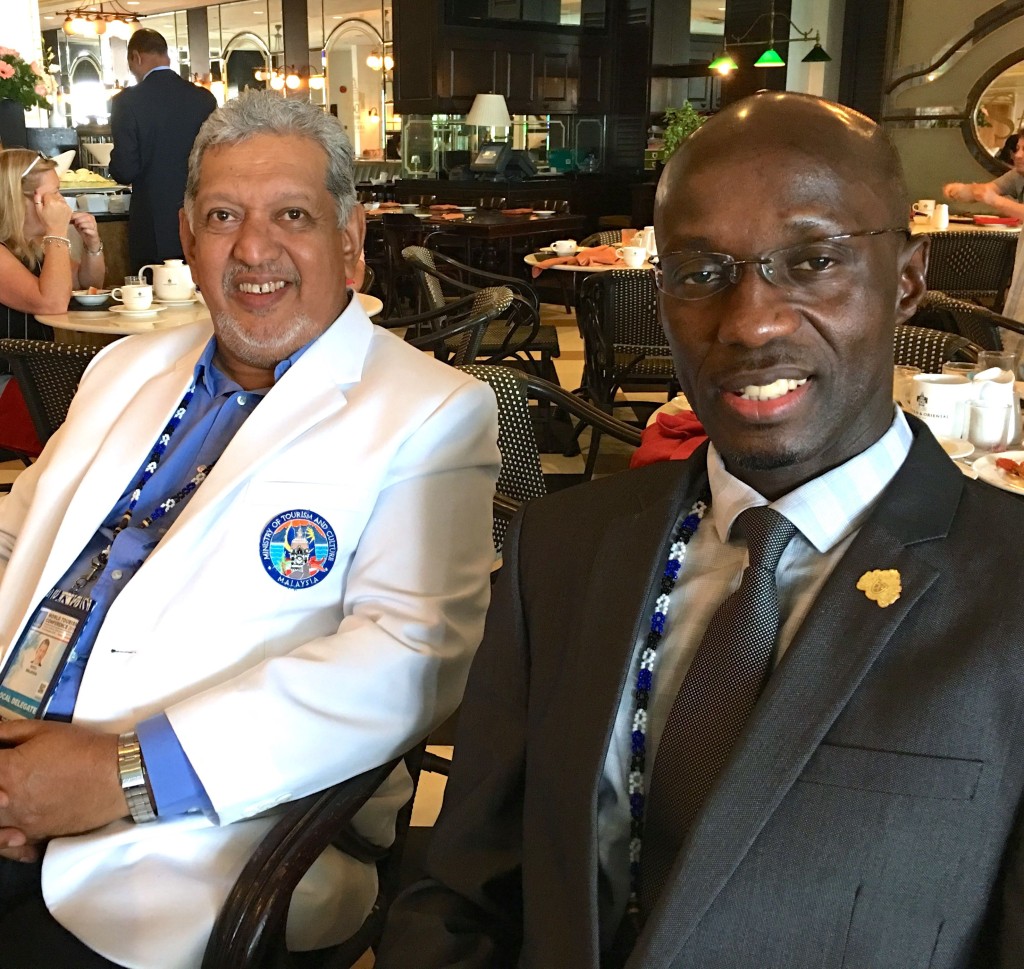 Tourism Malaysia DG Dato Seri Mirza and Gambian High Commissioner to Malaysia Aboubacarr Jak. |
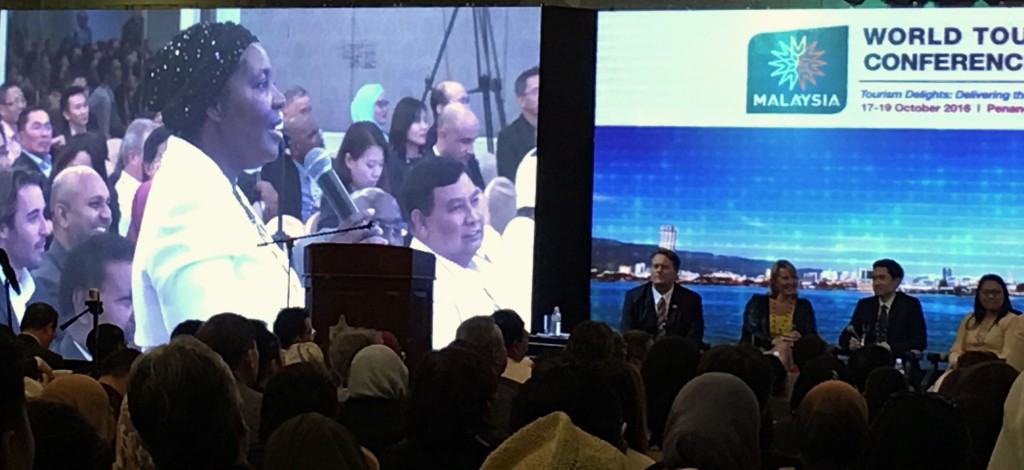 Namibian High Commissioner Anne Namakau Mutelo. |
The final session was devoted to Maximising the Power of Marketing. Mr. Jackson Pek, Vice President and General Counsel of Asia Pacific, Amadeus Asia, talked about how big data could be used to exploit customer demographics and profiles to conduct more targetted and cost-effective marketing campaigns. Ms. Helena Egan, Global Director, Industry Relations, TripAdvisor, gave participants several tips on how to make good use of the review website, including simple ways of responding to complaints. The last speaker, Mr. Jonathan Hyong-Joon Kim, Chief Creative Officer, Signal Pictures, Korea, was the only film-maker on the list. He wowed delegates with an electrifying grand-finale on how Korea reinvented its image from kimchi to K-pop, from conflict to “coolness.”
The professional, cultural and demographic diversity of the event further heightened its content. Tan Sri Francis Yeoh is a Malaysian-Chinese who hobnobs with global glitterati. Dato Seri Idris Jala lectures at Harvard and Oxford. Aireen Omar is one of Malaysia’s brightest rising-star female executives. One of the youngest speakers, Jackson Pek, 35, began his presentation by thanking AirAsia. Why? He said he wooed one of the red-clad stewardesses featured in the frontline ads and is now the happily-married father of two young daughters.
The Africans were big-time beneficiaries. The conference attracted two ministers of tourism from Sudan and Gambia, both Muslim-majority countries like Malaysia, as well as senior executives and diplomats from Kenya, Zimbabwe and Namibia. The Sudanese minister Mohamed Abuzaid Mustafa Mohamed said he was there to promote Sudan as a safe and secure country for tourism, learn from the Malaysian experience and attract investment. The Gambian minister Benjamin Roberts said he, too, was seeking investment but he also wanted to promote peace, tolerance and understanding in a world that seems to be heading in the opposite direction.
In addition to absorbing the eye-opening presentations, the African delegates were energetically interactive. In every session, at least one of them got up to comment, seek more information or publicise their own respective country’s attractions. One African delegate told me that they had much to learn from Asia on challenges such as visas, infrastructure and product development. Their strong presence at the UNWTO conference, plus their growing involvement with PATA, will open up enormous potential for increased business and leisure travel between the two emerging continents.
Mr. Lim Guan Eng, Chief Minister of Penang, also took the opportunity to highlight the unique attractions of his state, including the world’s first Subterranean Penang International Convention Centre (SPICE), the Skyway on Penang Hill and the upcoming world’s first butterfly, dragonfly and firefly sanctuary park due for completion in 2018.
One important result of the WTC 2016 could be improved Immigration services at Malaysian airports. Responding to a question on how to attract repeat visitors, Korean film-maker Jonathan Kim cited an unpleasant experience at KL airport. His flight from Seoul to Penang involved a transit stop in Kuala Lumpur. At the Immigration Counter, there were seven desks but only two immigration officers, which meant long queues. That could have been avoided, he said. The Namibian High Commissioner Anne Namakau Mutelo backed him up by complaining that the airport channel for diplomatic passports is never manned.
Minister Mohamed Nazri picked up on both points, noting that he had often mentioned them to the Immigration Department. Now that the entire conference had been video-taped, Immigration authorities would soon be able to see/hear the complaints for themselves, he said.
All this was interspersed by great one-liners by moderators and speakers that kept the audience in raptures. Not only did the event run on time, the energy levels were so high that all the panel sessions dispensed with the coffee breaks and just kept going.
The successful business model of the event is well-worth replicating industry-wide. It has also paved the way for the next stage: to mainstream the many issues of concern that were mentioned only in passing. For example, John Kester, the UNWTO Programme Manager, Tourist Trends and Marketing Strategies, said that with travel & tourism set to grow at an average of 2.9% per annum until 2030, there is a “critical need more than ever” to address rapidly emerging challenges such as the use of resources and energy dependency, waste water and solid waste, climate change adaption, the nuisance factor caused by mass tourism, social tensions, congestion and risks. None of these were talked about.
WTTC Chairman Mr Gerald Lawless noted the impact of safety and security. He said that the technological hardware to monitor passenger movements literally from point-to-point of a travel chain already existed. But he made no mention of how much this would cost, who would eventually have to pay for it and who would eventually profit from it.
Tan Sri Idris Jala warned twice and very emphatically about the impact of global economies and the levels of unsustainable debts in the Western countries. He cited especially the huge debt level of the United States. “I don’t know how they are going to get out of that.” I asked him to comment on the costs of global wars and how bloated military budgets were exacerbating these unsustainable debt levels. He answered only indirectly, thus: If ordinary people are asked what problems they would like to see a government prioritise, they will cite basic issues like crime, corruption, transportation, health and education. Defence will not figure very highly. Hence, he said, “governments should allocate their budgets accordingly.”
Other key issues that came up only fleetingly in the Q&A sessions included the impact of globalisation on local cultures, big data on privacy and perhaps, most critical, the ongoing need for balance, controls, carrying capacities and other ways of managing the new era of mass tourism. Although each issue is worthy of an entire conference in its own right, the questioners only got staccato answers. Both Minister Nazri and UNWTO chief Dr Taleb briefly mentioned the UN Sustainable Development Goals and the role of travel & tourism in making the world a better place and a force for good. But that’s as far as it went.
Human Development Capital consultant Peter Semone was the only one to say frankly that travel & tourism has made many mistakes in these first few decades of development. He was bold enough to admit one of these mistakes: Western governments give millions of dollars in aid to the developing countries, and deploy consultants who spend a lot of time writing reports which often just get shelved or lack context and understanding of local conditions. This needed to be better managed. “I have seen many projects fail because it wasn’t,” he said.
The biggest mistake travel & tourism is making now is to duck detailed discussion of these issues. Indeed, the feedback attracted by the WTC 2016 is enough to craft an agenda for the next WTC or any other conference looking to give them some traction.
The WTC 2016 certainly Delivered the Unexpected. Dato Seri Idris Jala put a great spin on it. Governments worldwide are under pressure to deliver on their promises. The Malaysian Government has set up a score-card system for all ministers to be rated on how well they are delivering on their agendas. He referred to this as becoming a “pregnant government. Why pregnant? Because when you get pregnant, you have no choice except to deliver.”



Liked this article? Share it!